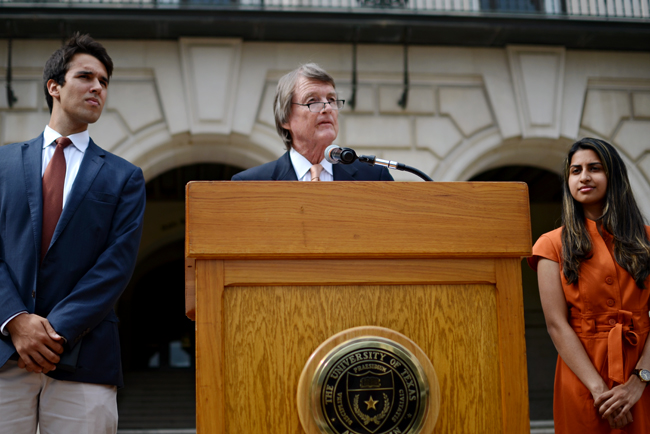The 5th Circuit Court of Appeals determined the University's holistic review admissions policy meets the strict scrutiny standard in a 2-1 decision Tuesday, allowing the University to continuing using race as a factor in its admissions decisions.
“The backdrop of our efforts here includes the reality that accepting as permissible policies whose purpose is to achieve a desired racial effect taxes the line between quotas and holistic use of race towards a critical mass,” Judge Patrick Higginbotham wrote in the majority opinion. “We have hewed this line here, persuaded by UT-Austin from this record of its necessary use of race in a holistic process and the want of workable alternatives that would not require even greater use of race.”
Abigail Fisher, a rejected undergraduate UT applicant, sued the University in 2008 for discriminating against her based on her race, claiming the admissions policy was in violation of the 14th Amendment. The case reached the Supreme Court in 2012.
In an unexpected decision, the Supreme Court determined the 5th Circuit court had failed to apply strict scrutiny to the University’s race-conscious admissions policy and sent the case back to the appeals court to determine whether the University’s policies are narrowly tailored and necessary to achieve a “critical mass” of minority students.
In a statement Tuesday, Fisher said she is committed to continuing the lawsuit and will appeal the decision.
“It is a shame that for the last six years, hundreds of UT applicants were denied admission because of UT’s racial and ethnic preferences,” Fisher said.
Edward Blum, director of the Project on Fair Representation, a program that has provided funding for Fisher’s case, said in a statement he was not surprised by the ruling.
“While disappointing, this opinion was not unexpected based upon the questioning and comments made by the court during our last hearing in November,” Blum said.
In November, attorneys for both Fisher and the University presented arguments to the appeals court. Representing the University, attorney Greg Garre said although UT does not use specific numbers to determine a critical mass, the University is still able to determine when this mass has been met.
The University uses race as part of an admissions process that determines 25 percent of the student body, and race is one of several factors that, combined, determine 4/7 of an applicant’s personal achievement index. That score is in turn combined with the applicant’s academic index score to determine if the applicant should be admitted to the University.
During a press conference Tuesday, President William Powers Jr. said he is glad the ruling upheld the constitutionality of UT’s admissions process and emphasized race is one of many factors involved in admissions decisions.
“The University of Texas will be able to continue using race as one of many factors, one of many factors, in a holistic review in order to shape a diverse student body,” Powers said. “One of our core arguments all along has been the educational value of diversity to all of our students, regardless of their background.”
Law professor David Gonzalez said the ruling means the University’s admissions process does the best job it can do in achieving diversity from a legal standpoint.
Student Government President Kori Rady said the ruling is a victory for the University.
“When our admissions policy is held up in a high court of law, it shows that what we’re doing is fair and right,” Rady said.
In a dissent, Judge Emilio Garza said the University does not pass the strict scrutiny test, which includes determining whether the University is using race as little as possible while still meeting its goal of diversity.
"A proper strict scrutiny analysis, affording the University 'no deference' in its strict scrutiny claims, compels the conclusion that the University's race-conscious admissions process does not survive strict scrutiny," Garza wrote.
This story has been updated since its original publication.


















